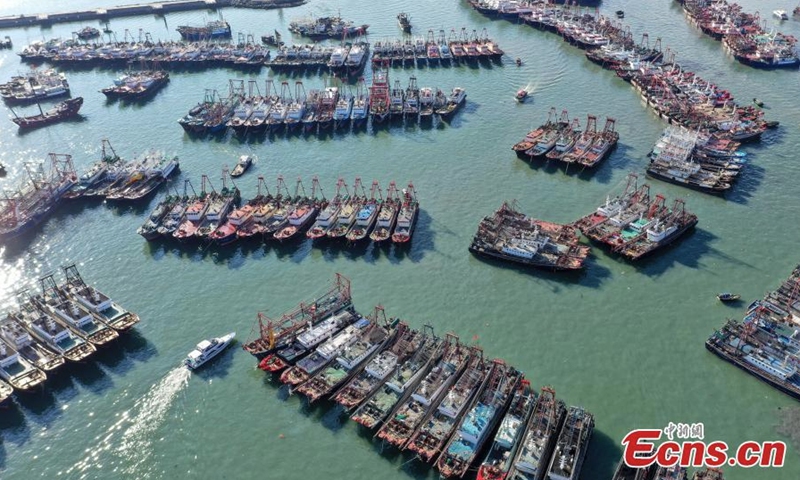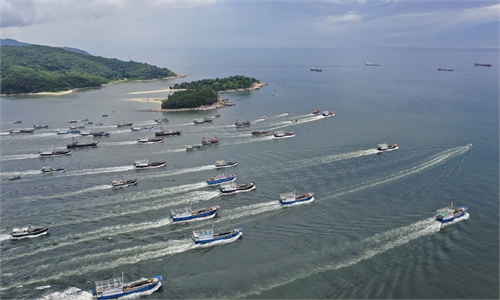Local govts impose strict anti-COVID measures for fishermen as summer fishing ban ends

Fishing boats berth at Zhapo port of Hailing island in Yangjiang city, south China's Guangdong Province, Aug. 15, 2022. Photo: China News Service/Chen Jimin
As hundreds of fishing boats set sail deep into the sea on Tuesday after the end of the three-and-half-month fishing moratorium for the South China Sea, local governments in China's southern coastal regions tightened anti-epidemic measures for fishermen, including prohibiting contact with overseas personnel and boasts, to avoid importing COVID-19.
Such strict measures were rolled out after trade with overseas fishermen was reportedly suspected of having triggered the COVID-19 outbreak in Sanya, South China's Hainan Province earlier this month.
Many places in South China's Guangdong Province have been cautioning fishermen about the risks of COVID-19 infection before the end of the summer fishing ban.
People on each fishing boat should have their health codes and temperature checked before going out to sea, according to a notice sent to residents in Guangdong's Shantou, which was provided to the Global Times by a local official on Tuesday.
The notice stated that fishermen are prohibited from contact with people or boats from overseas, as well as people from medium- and high-risk areas in China. If they had contacts with any of these people, they should report to the local government.
Fanyu district in Guangzhou, capital of Guangdong, even converted a ship into a nucleic acid testing point, so that fishermen can be tested before they return to port. Those fishermen can only go ashore if their tests results are negative, according a Fanyu district government notice.
Beihai city in South China's Guangxi Zhuang Autonomous Region, which also faced an outbreak of COVID-19 in July that stranded more than 2,000 tourists, announced on Tuesday plans to return to "normalized COVID-19 control and prevention" when cases ebb. Fishermen in Beihai need to show their green health codes (which indicate the person is safe from COVID-19 and not a close contact), along with a 48-hour valid nucleic acid test, before returning to work.
Such strict measures on fishermen came after Sanya, a tourist hub in South China's Hainan, saw a COVID-19 outbreak earlier this month, which, some media reports suggested, might have been triggered by fishery trade with people from overseas.
Hainan reported a total of 10,093 cases from August 1 to Tuesday, provincial health officials said at a Tuesday conference.
The provincial government said on Tuesday that all fishing ports and boats will remain under "static management" from Tuesday to August 22.
When asked if the end of the fishing moratorium will fuel the risk of imported cases, a Beijing-based immunologist, who requested anonymity, told the Global Times that such a risk cannot be ignored. Yet with strict COVID-19 prevention measures in place, such as frequent nucleic acid tests and cutting contact with fishermen from overseas, the risk can be reduced to a minimal level, the immunologist said.


